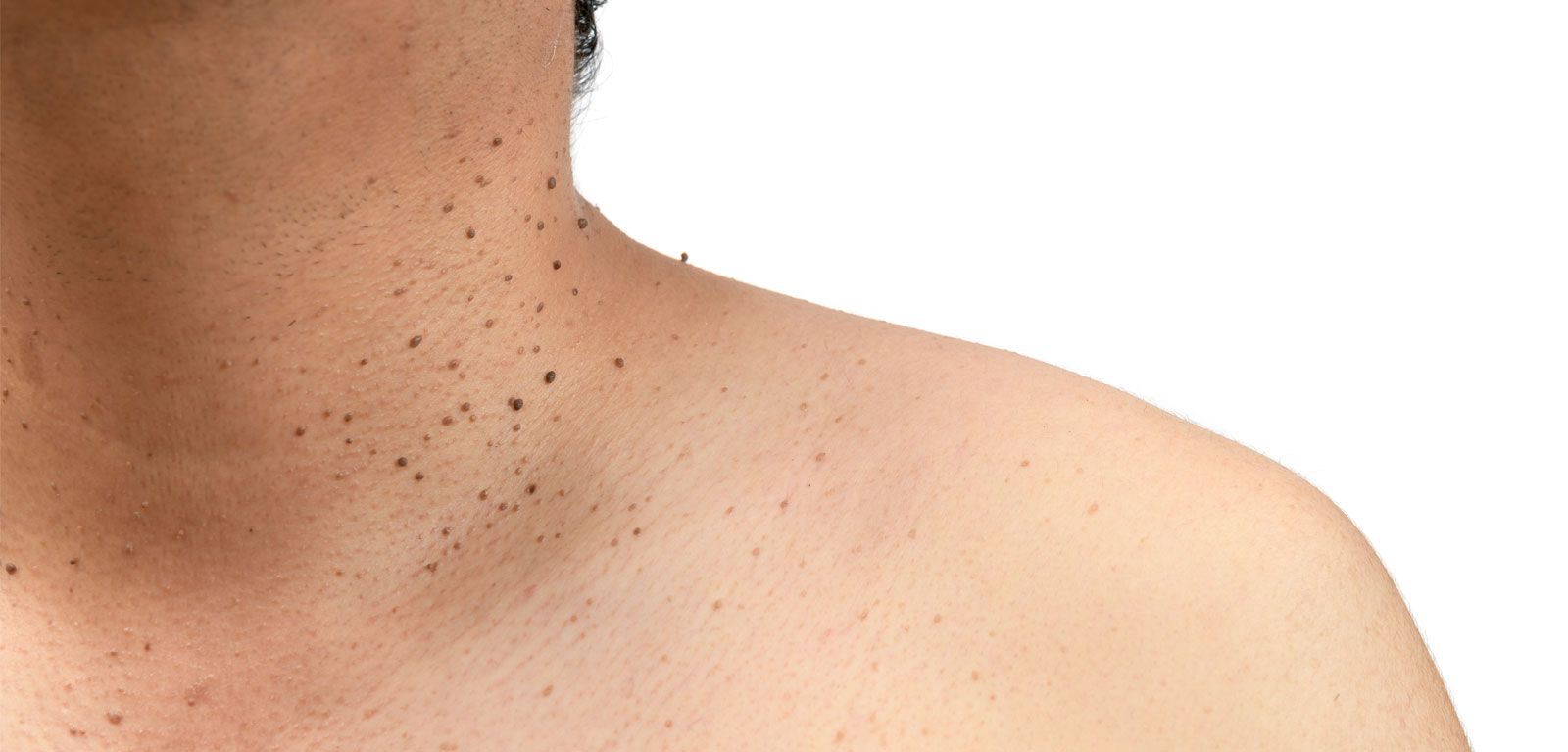Skin Tags.

Overview
Skin tags are small, flesh-colored growths hanging off the skin on a thin stalk. They can range in size from small to large. They are common and their incidence increases with age. Skin tags are generally not cancerous and do not cause pain, but can become irritated if constantly rubbed against clothing or jewelry. They are often seen in middle-aged or elderly adults, especially those who have experienced weight gain or have type 2 diabetes.
Cause
It is not known what causes skin tags. However, the following factors may play a role:
- Chafing and irritation from skin rubbing together
- High levels of growth factors
- Insulin resistance
- Human papillomavirus (wart virus)
- Pregnancy-Prone to developing skin tags because of all the hormonal changes in their bodies.
Symptoms
A skin tag may appear anywhere on the skin. Skin tags are usually found on the neck, armpits, around the groin, or
under the breasts. They are skin coloured or darker and range in size from 1mm to 5cm.
- smooth and soft
- can vary in color and size – from a few millimeters up to 5cm wide.
- knobbly and hang off the skin
- not contagious
- Skin tags do not usually cause any pain or discomfort.
Treatments
Skin tags can be removed for cosmetic reasons by the following methods:
- Cryotherapy (freezing)
- Surgical excision (often with scissors)
- Electrosurgery (diathermy)
- Ligation (a suture is tied around the neck of the skin tag)
Home care / DIY care
-
Live a Healthier Life- overweight, obese, and diabetic individuals are more likely to develop skin tags.
-
Adapting a healthy diet, with less sugar and saturated fat, and exercising regularly.
-
Wear Looser Clothing-Tight clothes rub against the skin more resulting in more sweat and more friction.
-
Keep Your Skin Dry- After showering, pat your skin completely dry and use medicated powder to keep skin folds from becoming sweaty and sticky.
-
Do not try to remove a skin tag without speaking to a dermatologist because they'll bleed heavily.
FAQs
Are Skin Tags Dangerous?
No, they’re not. Skin tags are simply fleshy skin-coloured growths made up of collagen fibres and blood vessels that
hang off the skin.
When can skin tags can be a problem?
Skin tags are harmless and do not usually cause pain or discomfort. That being said, skin tags can become irritated or
infected if they keep rubbing against other surfaces. They may also be a nuisance if they frequently catch on jewelry
or clothes. Removal is often for the sake of convenience or aesthetics and if they're affecting your self esteem. You'll
usually need to visit a dermatologist to have this done.
Are Skin Tags Contagious?
No. Unlike warts, skin tags don’t spread to other parts of the body or to other people, even through direct contact.
Removing one skin tag doesn’t directly lead to the growth of new tags, either.Some people might notice new skin
tags after having one removed from a certain part of the body. However, this simply means that the affected area is
more prone to skin tags by default.
Do skin tags grow bigger over time?
Skin tags can grow over time, becoming even more unsightly, especially if they are invisible areas. The cosmetic
concern is one of the primary reasons individuals seek treatment for their skin tags.
Can skin tags cancerous?
No. Skin tags are benign growths that contain collagen, a type of protein found throughout the body, and blood
vessels.It's possible for a cancerous growth to be mistaken for a skin tag.
best natural results
Elara has expertise in technological advances & their suitability, and adaptability to different subjects.
We strive to treat our patients with high quality affordable & excellent Skin and laser treatments. You will get that natural touch of treatment that you will hardly get anywhere with us.
We strive to treat our patients with high quality affordable & excellent Skin and laser treatments. You will get that natural touch of treatment that you will hardly get anywhere with us.
